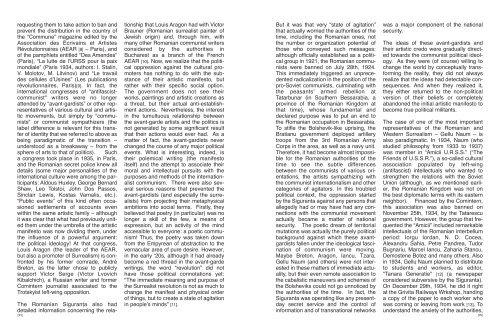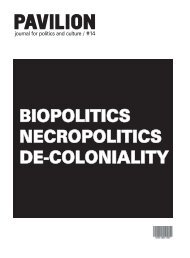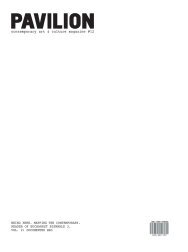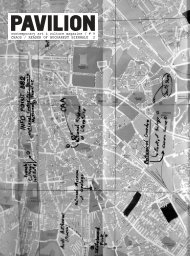Download pdf version of issue no. 16 (4 Mb) - Pavilion
Download pdf version of issue no. 16 (4 Mb) - Pavilion
Download pdf version of issue no. 16 (4 Mb) - Pavilion
Create successful ePaper yourself
Turn your PDF publications into a flip-book with our unique Google optimized e-Paper software.
equesting them to take action to ban and<br />
prevent the distribution in the country <strong>of</strong><br />
the “Commune” magazine edited by the<br />
Association des Écrivains et Artistes<br />
Révolutionnaires (AEAR [8] – Paris), and<br />
<strong>of</strong> the pamphlets entitled “Des Amendes”<br />
(Paris), “La lutte de l’URSS pour la paix<br />
mondiale” (Paris 1934, authors: I. Stalin,<br />
V. Molotov, M. Litvi<strong>no</strong>v) and “Le travail<br />
des cellules d’Usines” (Les publications<br />
révolutionnaires, Paris)[9]. In fact, the<br />
international congresses <strong>of</strong> “antifascistcommunist"<br />
writers were <strong>no</strong> longer<br />
attended by “avant-gardists” or other representatives<br />
<strong>of</strong> various cultural and artistic<br />
movements, but simply by "communists"<br />
or communist sympathizers (the<br />
label difference is relevant for this transfer<br />
<strong>of</strong> identity that we referred to above as<br />
being paradigmatic <strong>of</strong> the transition –<br />
understood as a breakaway – from the<br />
sphere <strong>of</strong> arts to that <strong>of</strong> politics). Such<br />
a congress took place in 1935, in Paris,<br />
and the Romanian secret police knew all<br />
details (some major personalities <strong>of</strong> the<br />
international culture were among the participants:<br />
Aldous Huxley, George Bernard<br />
Shaw, Leo Tolstoi, John Dos Passos,<br />
Sinclair Lewis, Kostas Varnalis, etc.).<br />
“Public events” <strong>of</strong> this kind <strong>of</strong>ten occasioned<br />
settlements <strong>of</strong> accounts even<br />
within the same artistic family – although<br />
it was clear that what had previously united<br />
them under the umbrella <strong>of</strong> the artistic<br />
manifesto was <strong>no</strong>w dividing them, under<br />
the influence <strong>of</strong> a powerful argument:<br />
the political ideology! At that congress,<br />
Louis Aragon (the leader <strong>of</strong> the AEAR,<br />
but also a promoter <strong>of</strong> Surrealism) is confronted<br />
by his former comrade, André<br />
Breton, as the latter chose to publicly<br />
support Victor Serge (Victor Lvovich<br />
Kibalchich), a Russian writer and former<br />
Comintern journalist associated to the<br />
Trotskyist left-wing opposition.<br />
The Romanian Siguranța also had<br />
detailed information concerning the rela-<br />
[94]<br />
tionship that Louis Aragon had with Victor<br />
Brauner (Romanian surrealist painter <strong>of</strong><br />
Jewish origin) and, through him, with<br />
many other Romanian communist writers<br />
considered by the authorities in<br />
Bucharest as a branch <strong>of</strong> the French<br />
AEAR [10]. Now, we realize that the political<br />
oppression against the cultural promoters<br />
has <strong>no</strong>thing to do with the substance<br />
<strong>of</strong> their artistic manifesto, but<br />
rather with their specific social option.<br />
The government does <strong>no</strong>t see their<br />
works, paintings and artistic creations as<br />
a threat, but their actual anti-establishment<br />
actions. Nevertheless, the interest<br />
in the tumultuous relationship between<br />
the avant-garde artists and the politics is<br />
<strong>no</strong>t generated by some significant result<br />
that their actions would ever had. As a<br />
matter <strong>of</strong> fact, the avant-gardists never<br />
changed the course <strong>of</strong> any major political<br />
events. What is interesting, indeed, is<br />
their polemical writing (the manifesto<br />
itself) and the attempt to associate their<br />
moral and intellectual pursuits with the<br />
purposes and methods <strong>of</strong> the internationalist<br />
communism. There were also several<br />
serious reasons that prevented the<br />
avant-gardists (and especially the surrealists)<br />
from projecting their metaphysical<br />
ambitions into social terms. Firstly, they<br />
believed that poetry (in particular) was <strong>no</strong><br />
longer a skill <strong>of</strong> the few, a means <strong>of</strong><br />
expression, but an activity <strong>of</strong> the mind<br />
accessible to everyone: a poetic communism!<br />
Thus, the poetry was taken down<br />
from the Empyrean <strong>of</strong> abstraction to the<br />
vernacular area <strong>of</strong> pure desire. However,<br />
in the early ‘20s, although it had already<br />
become a red thread in the avant-garde<br />
writings, the word “revolution” did <strong>no</strong>t<br />
have those political con<strong>no</strong>tations yet:<br />
"The immediate meaning and purpose <strong>of</strong><br />
the Surrealist revolution is <strong>no</strong>t as much to<br />
change the manifest and physical order<br />
<strong>of</strong> things, but to create a state <strong>of</strong> agitation<br />
in people’s minds” [11].<br />
But it was that very “state <strong>of</strong> agitation”<br />
that actually worried the authorities <strong>of</strong> the<br />
time, including the Romanian ones, <strong>no</strong>t<br />
the number or organization potential <strong>of</strong><br />
those who conveyed such messages:<br />
although <strong>of</strong>ficially established as a political<br />
group in 1921, the Romanian communists<br />
were banned on July 28th, 1924.<br />
This immediately triggered an unprecedented<br />
radicalization in the position <strong>of</strong> the<br />
pro-Soviet communists, culminating with<br />
the peasants’ armed rebellion at<br />
Tatarbunar (in Southern Bessarabia, a<br />
province <strong>of</strong> the Romanian Kingdom at<br />
that time), whose fundamental and<br />
declared purpose was to put an end to<br />
the Romanian occupation in Bessarabia.<br />
To stifle the Bolshevik-like uprising, the<br />
Bratianu government deployed artillery<br />
troops from the 3rd Romanian Army<br />
Corps in the area, as well as a navy unit.<br />
Therefore, it had become almost impossible<br />
for the Romanian authorities <strong>of</strong> the<br />
time to see the subtle differences<br />
between the communists <strong>of</strong> various orientations,<br />
the artists sympathizing with<br />
the communist internationalism and other<br />
categories <strong>of</strong> agitators. In this troubled<br />
political context, the oppression started<br />
by the Siguranta against any persons that<br />
allegedly had or may have had any connections<br />
with the communist movement<br />
actually became a matter <strong>of</strong> national<br />
security. The poetic dream <strong>of</strong> territorial<br />
mutations was actually the purely political<br />
background against which these avantgardists<br />
fallen under the ideological fascination<br />
<strong>of</strong> communism were moving.<br />
Maybe Breton, Aragon, Iancu, Tzara,<br />
Gellu Naum (and others) were <strong>no</strong>t interested<br />
in these matters <strong>of</strong> immediate actuality,<br />
but their even remote association to<br />
the cabalistic maneuvers and schemes <strong>of</strong><br />
the Bolsheviks could <strong>no</strong>t go un<strong>no</strong>ticed by<br />
the authorities <strong>of</strong> the time. In fact, the<br />
Siguranta was operating like any presentday<br />
secret service and the control <strong>of</strong><br />
information and <strong>of</strong> transnational networks<br />
was a major component <strong>of</strong> the national<br />
security.<br />
The ideas <strong>of</strong> these avant-gardists and<br />
their artistic credo were gradually directed<br />
towards the communist political ideology.<br />
As they were (<strong>of</strong> course) willing to<br />
change the world by conceptually transforming<br />
the reality, they did <strong>no</strong>t always<br />
realize that the ideas had detectable consequences.<br />
And when they realized it,<br />
they either returned to the <strong>no</strong>n-political<br />
<strong>version</strong> <strong>of</strong> their beliefs or completely<br />
abandoned the initial artistic manifesto to<br />
become true political militants.<br />
The case <strong>of</strong> one <strong>of</strong> the most important<br />
representatives <strong>of</strong> the Romanian and<br />
Western Surrealism – Gellu Naum – is<br />
also paradigmatic. In 1934, Naum (who<br />
studied philosophy from 1933 to 1937)<br />
was member in “Amicii U.R.S.S.” (“The<br />
Friends <strong>of</strong> U.S.S.R.”), a so-called cultural<br />
association populated by left-wing<br />
(antifascist) intellectuals who wanted to<br />
strengthen the relations with the Soviet<br />
Union (although, as we mentioned earlier,<br />
the Romanian Kingdom was <strong>no</strong>t on<br />
the best diplomatic terms with its eastern<br />
neighbor). Financed by the Comintern,<br />
this association was also banned on<br />
November 25th, 1934, by the Tatarescu<br />
government. However, the group that frequented<br />
the “Amicii” included remarkable<br />
intellectuals <strong>of</strong> the Romanian interbellum<br />
period: Iorgu Iordan, N. D. Cocea,<br />
Alexandru Sahia, Petre Pandrea, Tudor<br />
Bugnariu, Marcel Iancu, Zaharia Stancu,<br />
Demostene Botez and many others. Also<br />
in 1934, Gellu Naum planned to distribute<br />
to students and workers, as editor,<br />
"Tanara Generatie" [12] (a newspaper<br />
considered subversive by the Siguranta).<br />
On December 29th, 1934, he did it right<br />
at the Grivita Railways Wrkshop, handing<br />
a copy <strong>of</strong> the paper to each worker who<br />
was coming or leaving from work [13]. To<br />
understand the anxiety <strong>of</strong> the authorities,<br />
[95]








